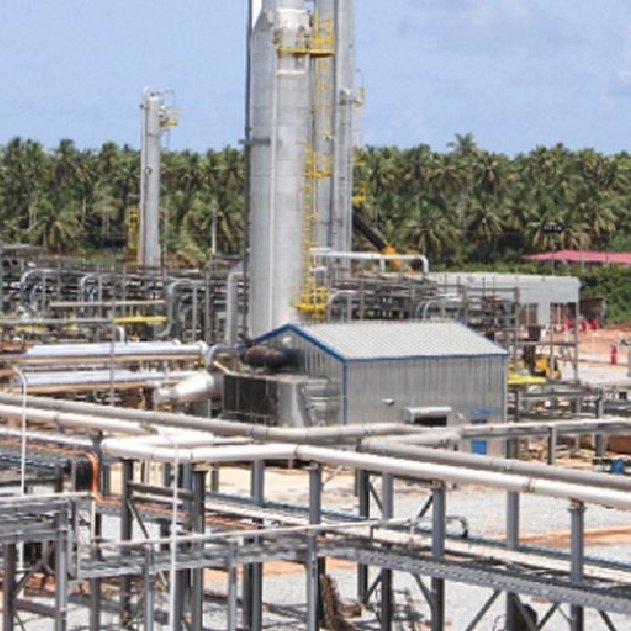ACEP opposes gov't's endorsement of GNGC as national gas aggregator
 Gas Plant
Gas Plant
The African Center for Energy Policy (ACEP) has kicked against the endorsement of the Ghana National Gas Company (GNGC) by the Office of the President as the national gas aggregator.
It is rather recommending GNGC, a subsidiary of GNPC, as a response to the implementation of the Gas Master Plan, saying the optimal option for achieving results in the oil and gas sector for Ghana is to pursue the top-down integration model with GNPC at the top as an anchor.
This, it believes, allows GNPC to support subsidiaries along the value chain with their balance sheet.
This also requires that GNPC is refocused to invest its money in the core oil and gas business as has been done by other integrated national oil companies.
In a statement, ACEP said the decision of the presidency was based on a document submitted by GNGC, which makes a case for adjusting the institutional framework in the gas sector.
In that document, GNGC highlights the key issues in the sector.
However, in ACEP’s assessment, none of the key issues raised is a function of GNGC being the aggregator.
It said: “Under the current arrangement, GNPC occupies the strategic responsibility of gas aggregator with a function to pool gas resources from all upstream sources and sell to bulk consumers.
“GNGC is primarily responsible for processing of gas and the sale of natural gas liquids. There has also been the policy flexibility for the GNGC to sell gas to non-power and industrial consumers. Under the proposed arrangement, GNPC will cease to perform the responsibility of gas aggregator to allow GNGC to integrate the mid-stream gas operations (Aggregation, Processing and Transmission).”
In 2015, government approved the takeover of GNGC by GNPC as a subsidiary for the latter. A key consideration for this consolidation was to make it possible to have a more integrated management and financing of projects in the oil and gas sector.
This was particularly necessary to provide the needed financial securities for the development of the Offshore Cape Three Points (OCTP) project.
ACEP’s position on this arrangement was that GNPC had the capacity to manage gas projects and had the financial muscle through its share of petroleum revenues to undertake new gas projects, for the purpose of expanding gas processing and transmission facilities.
ACEP maintained the position that if this had been followed, it could have given GNPC a sharper focus on the oil and gas industry, adding, it was evident at the time that GNGC could not raise financing to undertake the critical expansion of their processing facility, and also provide financial guarantee for the upstream development as the aggregator.
Continuing, the statement emphasised: “Being a gas aggregator comes at a significant risk imposed by the industry dynamics such as being witnessed with Covid-19 and the usual volatilities.
“When GNPC securitised the investment of the OCTP project, it was done with the fact that GNPC was the most capable state entity within the value chain to provide securities for the project. GNPC was in such a better position with cash reserves, was lending to government and could negotiate a loan at an interest rate of 4.43 per cent from Deutsche Bank.”
Furthermore, “Transferring the role of an aggregator to GNGC also introduces significant risks for upstream investment and the power sector. The weak balance sheet of GNGC makes it unattractive to the investor community which has implication for exploration and production. The coincidence of the policy change with the challenging global oil industry on the back of COVID-19 further exposes the country to high investment risks.”
Source: classfmonlinee.com
Trending Business

BoG calls on UK diaspora to invest beyond remittances
16:44
GRA Tax Division visits Palace Mall to enforce VAT reduction and COVID-19 levy removal
11:56
VALCO targets 5,000 jobs, $1 billion annual GDP
10:50
VALCO to end number plate imports from China, announces DVLA partnership for local production
11:52
Expired D.V. plates illegal in 2026 — DVLA urges vehicle owners to renew early
09:57
GIPC Boss urges diaspora to invest remittances into productive ventures
15:27
FABAG rejects Tema Port claims, warns of worsening conditions at bulk and bagged cargo section
12:15
AWIMA Leadership Awards & Conference heads to Cape Town for 2026 edition
11:17
GRA/Truedare contract sparks outrage over potential system duplication
10:23
Sammy Gyamfi: GoldBod made nearly GHS1 billion surplus
01:05




